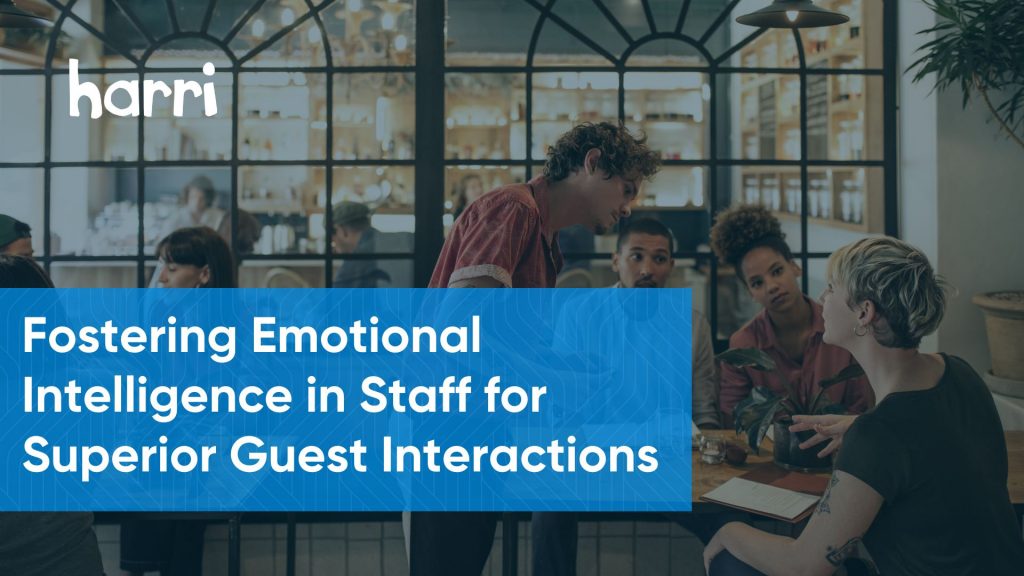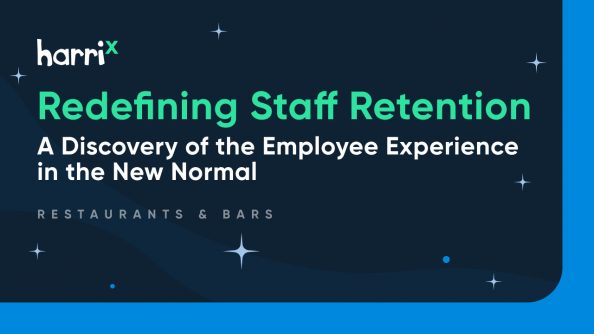Enhancing Emotional Intelligence in Hospitality Leadership

- By Harri Insider Team | July 23, 2024
In a hyper-connected world, humans sometimes have challenges connecting with others. Emotional intelligence is an increasingly important skill in every industry and one that can have real impacts within the hospitality sector. The emotional intelligence of staff will directly affect guest experiences and service quality – which means a great deal to your bottom line.
In this article, we’re exploring how hospitality leaders can nurture a more empathetic and effective team through leadership skills and emotional intelligence.
Enhancing Emotional Intelligence in Hospitality Leadership
Emotional intelligence in the workplace refers to the ability to recognize, understand, and manage emotions effectively, both in oneself and in others. It involves being aware of and controlling one’s own emotions, as well as being empathetic and understanding towards the emotions of colleagues and team members.
Emotional intelligence in the workplace can help improve communication, build stronger relationships, resolve conflicts, and enhance overall teamwork and productivity. The core tenets of emotional intelligence usually include:
- Empathy – the ability to understand and share the feelings of others. It involves being able to put yourself in someone else’s shoes and truly understand their emotions and experiences.
- Self-awareness – the ability to recognize and understand one’s thoughts, emotions, and behaviors. It involves being conscious of your strengths, weaknesses, values, and beliefs.
- Social skills – the competencies that enable us to interact effectively with others. They involve various aspects of communication, such as active listening, verbal and nonverbal communication, conflict resolution, and cooperation.

The Real Value of Leadership Skills and Emotional Intelligence
It might not be immediately clear how emotional intelligence can affect things like guest interactions or satisfaction levels, but it does. Emotional intelligence can lead to better customer satisfaction and even higher profits in several ways.
Understanding Customer Needs
Emotional intelligence helps employees be able to empathize with customers and understand their needs. By recognizing and addressing these (sometimes unspoken) emotional needs, employees can provide more personalized and tailored solutions, leading to higher customer satisfaction and loyalty.
Effective Communication
We’ve all had tough customer service experiences, where we don’t feel like the employee hears us or even cares. Emotional intelligence is key in these scenarios, as it enhances communication skills, enabling employees to listen actively, understand customer concerns, and respond appropriately. Improved communication builds trust, resolves conflicts, and ensures that customer expectations are met, resulting in more instances of happy customers.
Handling Customer Complaints
The hospitality industry is full of tricky situations that take some finesse to resolve, and emotionally intelligent employees are better equipped to handle customer complaints and difficult situations. They can remain calm, empathize with the customer’s frustration, and find effective solutions to resolve issues. This approach not only leads to customer resolutions but also helps in retaining customers and preventing negative word-of-mouth.
Building Strong Relationships
Emotional intelligence fosters positive relationships with customers by creating a sense of trust and rapport. Employees who understand and connect with customers on an emotional level can build long-term relationships, leading to repeat business and customer loyalty.
Employee Engagement and Productivity
Emotional intelligence in the workplace promotes a positive work environment where employees feel valued, supported, and motivated. Engaged and happy employees are more likely to help each other, step up when needed, and collaborate for better results. Plus, emotionally intelligent leaders can inspire and motivate their teams, resulting in higher employee productivity and overall business success.

5 Practical Tips for Enhancing Emotional Intelligence
Many people are born with higher degrees of emotional intelligence, but it can also be cultivated. Strong managers and owners will try to help their employees develop this soft skill through a variety of leadership skills and emotional intelligence. Here are some tactics worth trying.
- Encourage self-awareness. Support your team members in developing self-awareness by reflecting on their emotions, thoughts, and reactions. Help them understand how their emotions can impact problem-solving and communication outcomes. This awareness will enable them to better manage their emotions and make more informed decisions.
- Empower your team in new ways. Many hospitality establishments use a bunch of different tools to foster engagement, Harri provides a one-stop solution to give them everything they need to make better decisions. Start by providing more support to new hires so they feel in the loop, sharing important updates and targeted news, and celebrating milestones. All of these things go a long way in making someone feel valued so that they can trust their decision-making when it comes to conflict resolution.
- Train on non-verbal communication. Not everyone is great at picking up on non-verbal cues, but they can be better. Highlight the significance of non-verbal cues in communication, and help your team members become aware of their non-verbal signals and how they can impact others. Try making training materials and resources readily available. For example, use the Harri group channels to upload media like videos or pamphlets on the topic, and have a discussion around the material in targeted message channels.
- Facilitate more feedback. Create a feedback-rich environment where team members can provide and receive feedback on their problem-solving and communication skills. Encourage constructive criticism and help them to use feedback as an opportunity for growth and improvement. With Harri’s Solutions, you can make feedback part of daily processes by measuring sentiment and gathering employee feedback, as well as sharing public recognition and important updates. This creates two-way communication around feedback so that employees don’t feel criticized – but like they are part of an ongoing conversation.
- Promote continuous learning. The smarter your team becomes, the better (for everyone). Provide opportunities for your team members to enhance their emotional intelligence skills through training, workshops, and resources. Encourage them to apply the techniques they learn in real-life situations and share their experiences with the team. You can use Harri as a single repository for resources, training materials of all media types, and in-depth discussions. You can even create custom message groups based on role, location, or unit, and then encourage team members to share what they learned with each other or ask questions right on the platform.
By guiding your team members in enhancing their emotional intelligence, particularly in problem-solving and communication, you can create a more effective team that is capable of resolving challenges and achieving shared goals.
Join the Leaders in Hospitality
Elevate your team’s performance and guest satisfaction today. Discover our training programs designed to enhance emotional intelligence in your hospitality business.
Request a demo now to start your journey towards more empathetic leadership.





















